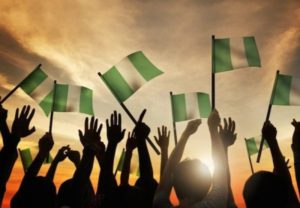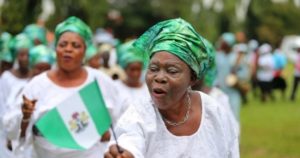By David Edremoda
Every aspect of our national life suffers from one form of incontinence or the other, particularly as evidenced in our short term, dim view of national planning and global competitiveness. That disease has led many to conclude that Nigeria is a God-forsaken nation, which was the point that the girl-in-the-dustbin tried to make. Many citizens also prefer to see the country as a destiny-killer that is best given up for dead, hence the pride with which Nigerians announce that one friend or relation has ‘relocated.’ I do not share these views.
Since October 1 when Nigeria celebrated 60 years of Independence so many contrasting images and messages have flooded the social media space. Some were positive; many were negative and a lot more, as the French would say, was comme ci, comme ca (neither good nor bad).
Each of them merely reflected the stark realities of the country from the lens of the individuals that posted them. One of these especially stands out. It was a montage of pictures of a delectable young lady clad in the national colours and photographed in different poses at various dumpsites across a city, probably Lagos or Aba. I have guessed it would be one of these places because both cities appear to have the same peculiar challenges in their fight against filth.

The images reminded one of the so many things. From one angle, it reflected the statement credited to a former Second Republic Minister, Umaru Dikko, who reportedly said there was no hunger in Nigeria because he was yet to see Nigerians eating from the dustbin. Another view could be tied to the statement by the late doyen of journalism, Dele Giwa, who wrote that ‘Nigerians are unshockable!’ He had been horrified to note that Nigerians tend to gloss over issues that ordinarily would have shocked anyone in a sane society. A third perspective could be associated with the view of former military President, Ibrahim Babangida, who philosophically spoke of architecture amid ruins if the Nigerian condition were to be critically examined. Depending on what side of the country – the good, the bad or the ugly – that you wish to see, all three perspectives can be accommodated in any study of Nigeria. And all viewpoints can be placed within milestones in the nation’s history since independence in 1960.
Howsoever we choose to look at it, there is no denying that there are so much hunger and anger in the land, no thanks to years of the flip-flops of equally weak economic planning. When in the 1980s former President Shehu Shagari spoke of flexing Nigeria’s oil muscle in answer to some knotty international issues, we all knew that Nigeria would soon come to grief. The oil glut that followed exposed our soft economic underbelly. Yet the nation’s economic planners did not learn any lesson.
Even today, our penchant, as government and as individuals, for conspicuous consumption without a concomitant improvement in manufacturing has accounted for the fast depletion of the nation’s external reserves that currently stand at $35 billion compared with Saudi Arabia’s, which is in excess of $400 billion. But it is not just in the failing economy that things are wrong in Nigeria. Every aspect of our national life suffers from one form of incontinence or the other, particularly as evidenced in our short term, dim view of national planning and global competitiveness. That disease has led many to conclude that Nigeria is a God-forsaken nation, which was the point that the girl-in-the-dustbin tried to make. Many citizens also prefer to see the country as a destiny-killer that is best given up for dead, hence the pride with which Nigerians announce that one friend or relation has ‘relocated.’ I do not share these views.

Instead, I prefer to see Nigeria from the viewpoint of my friend who recently likened the condition of the country to a plank in the hands of a bad carpenter. The more the artisan chisels off the wood ostensibly to reshape it, the more in fact he neither can find a befitting shape for the wood nor can he stop chiselling. But rather than view the ‘bad carpenter’ as an amorphous clique that we call ‘the leadership’, I will be more comfortable with seeing the bad workman as you and I.
The truth is, there is nothing wrong with Nigeria but there is everything wrong with all of us who choose to be against Nigeria. If we all are agreed that Providence has blessed this nation bountifully in terms of human and material resources, why then do we seek to lay the blame for under-development on factors that are outside of us? Let us even start with the leadership that we love to flog so much. Back in the day, people selected for leadership positions, from the family unit to the national level, were individuals of impeccable character whose pedigrees were very well known.
What then changed? Not much. Yet the little that changed was sufficiently profound to alter the way we think of ourselves as a people. Our path to greatness as a nation was derailed from the moment we began to choose self above others; when we began to dispense with the norm of hating unexplainable wealth; when we became more intolerant of dissenting views and when we began to use religion to reinforce divisive politicking. It also began when we started to use literacy to justify our miseducation and diminished global perspectives and when we began to embrace violence in all its ramifications in leadership selection, in negotiating natural resource management and in disrupting social harmony. Funny but true: as individuals or a collective of ethnic nationalities, we know everything that is wrong with Nigeria and we know everything that is right with every other nation particularly if we have been fortunate to visit those ‘good countries.’
Yet, we are most unwilling to adopt global best practice in our fatherland. Do not tell me that Nigeria has been unfair to you. Do not tell me our leaders are visionless. Do not tell me how things work well in America and ‘even in the ordinary Republic of Benin.’ Instead, let us debate how to make Nigeria better. Let us share experience on how you and I can contribute to any process or movement to change what we do not want in our country.
Do you know why ‘Black Lives Matter’ became a movement to effect social change in the US and resonated with people around the world? It is because people are tired of condoning evil in the name of political correctness. It is the reason that #EndSARS has gained ground in Nigeria to protest growing extrajudicial killings by law enforcement agents. A good cause will always find support when people elect to act according to the dictates of their conscience. Any cause that requires people to be financially induced to join cannot be a good cause. That is because it is much easier to work for the good of the greatest number of people through strong institutions than to seek to protect parochial ethnic, religious and political interests through building strong men and women.
On its own, Nigeria is all right, though the situation may be challenging now. We have everything we need to achieve greatness. We are blessed with a large youth population; we are blessed with vast natural resources and we are blessed with brilliant minds doing great things across the globe. But we need to change our mindset that tends to see Nigeria as a cursed nation. If Nigeria is to become unstoppable, we as citizens need to feel good about our country. That positive attitude will, in turn, release inherent transformative and regenerative energy that would propel us to think, say and, naturally, do what is right even when the law is not watching. That is the way to side with one’s country. Anything to the contrary is to take a position against your country in the hope that the law will not take its course. If citizens choose to do right without being coerced, it will be difficult for any leader to institute arbitrary governance. If we do not, we shall remain, as Afrobeat king, Fela said: a Big, Blind Country (BBC). In this matter, there are no grey areas. You are either for or against Nigeria. Where exactly do you stand?
Edremoda is a Lagos-based public affairs commentator